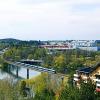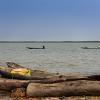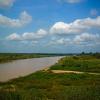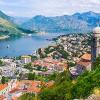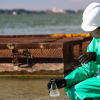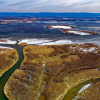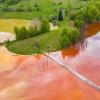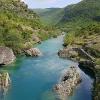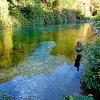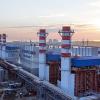Environment Press Releases
Displaying Results 126 - 150 of 369
The United Nations Economic Commission for Europe (UNECE) and the European Investment Bank, the financial investment arm of the European Union, have signed today a Memorandum of Understanding (MoU) to strengthen joint efforts to promote economic cooperation, cohesion
On 16 June, Guinea-Bissau became the 4th African country (45th party) to accede to the Convention on the Protection and Use of Transboundary Watercourses and International Lakes (Water Convention), whose secretariat is provided by UNECE. It is also a party to the Convention
Despite decades of discussions on the challenges and intersections between gender and transport, progress has been slow in implementing a gender perspective in transport policies. This has been problematic, for example, in urban planning which fails to
The COVID-19 pandemic spread around the world at lightning speed, devastating cities and communities and prompting a lockdown. The lockdown period also provided some respite for nature, resulting in memorable sights of ‘nature unlocked’ in our urban habitats.
To immortalize such sights and to
Human-caused methane emissions are rising, and must be reduced by 40 to 45 per cent by 2030 to limit global temperature rise to 1.5° C, warned the Global Methane Assessment released last month by the Climate and Clean Air Coalition (CCAC) and the United Nations Environment Programme (UNEP).
Ghana’s transboundary river basins, namely the Volta River basin (shared with Benin, Burkina Faso, Côte d’Ivoire, Mali and Togo – home to over 23 million people, with a population projected to more than double by 2050), Bia and Tano Rivers (shared with Côte d’Ivoire) and Todzie-Aka basin (shared
Today, European countries adopted the Vienna Declaration to spur the transformation towards clean, safe, healthy and inclusive transport and mobility, with a strong focus on promoting cycling across the pan-European region.
The Vienna
As one of the most sustainable, inclusive, safe, and healthy forms of mobility, cycling received a major boost today with the adoption of the first-ever Pan-European Master Plan for Cycling Promotion at the Fifth High-Level Meeting on Transport, Health and Environment (THE PEP). The Master Plan is
Since 2018, UNECE has been assisting Montenegro in the implementation of the recommendations from the third Environmental Performance Review (EPR) carried out in 2015.
Since the beginning of the COVID-19 pandemic,
More robust monitoring and measuring systems are required to meet the Sustainable Development Goals (SDGs), according to a UNECE report on Measuring and Monitoring progress towards SDGs that uses a “nexus” approach to chart a course for more “joined up” activities.
High-quality statistics
Localizing the Sustainable Development Goals at the urban level is crucial to deliver on the 2030 Agenda, stresses UNECE in a new report that advocates for a “cities-based” and “people-smart” approach to sustainable development.
With cities today as the driving force in economic,
UNECE calls for integrated and sustainable natural resource use through a "nexus" approach
The use of material resources, fuelled by economic and population growth, urbanisation and societal changes, has increased more than ten times since 1900 and is set to double again by 2030. The annual global extraction of materials has increased from 27 to 92 billion tonnes since 1970, while the
Countries of the Pan-European region can seize the COVID-19 recovery as a turning point for green and healthy transport and mobility as a foundation to build a better future for all, urges a UN Task Force.
Bringing together over 50 experts from member States, international institutions
Across the world, 153 countries share rivers, lakes and aquifers. Transboundary basins cover more than half of the Earth’s land surface, account for an estimated 60 per cent of global freshwater flow and are home to more than 40 per cent of the world’s population. Transboundary water cooperation is
Industrial accidents at tailings management facilities (TMFs) - which handle and store the fine-grained waste materials remaining after extracting minerals and metals from the earth, often containing toxic and hazardous substances - have resulted in devastating effects
Albania and Montenegro have agreed to establish a joint technical working group on “Monitoring & assessment” and to develop and implement an information exchange protocol to operationalize their cooperation on the shared Cijevna/Cem
UN Resident Coordinators based in the countries of Europe and Central Asia have noted that most countries are prioritizing economic recovery during the COVID-19 period and that environmental perspectives are often ignored. The regional interagency Issue-based Coalition on Environment and Climate
The Transport, Health and Environment Pan-European Programme (THE PEP), jointly serviced by the UNECE and the WHO Regional Office for Europe, will hold its Fifth High-Level Meeting from 17 to 18 May 2021. The Fifth High-Level Meeting was due to be held in November
Over the past 20 years, international and national vehicle regulations have introduced increasingly stringent ceilings on particulate emissions (PM 2.5 and 10) from vehicles’ exhaust.
As a result, according to the emission inventories
Nitrogen (N) is essential for life. It is an element of chlorophyll in plants and of protein (amino acids) in animals and humans. As such, it is a major nutrient to allow food, fibre and biofuel production.
However, human activities over the last century (use of synthetic inorganic N fertilizers
Economic and social development in Albania crucially depends on the availability and good quality of water, land, forest and environmental resources, which are, however, under increasing pressure, including from climate change. An online consultation on the Water-Energy-Food-Ecosystems Nexus in
The new repository will help address disaster risks in line with the 2030 Agenda for Sustainable Development
It consolidates good practices and lessons learned over the past decade in Europe and beyond in the fields of land-use planning and industrial safety
Strategic environmental assessment and environmental impact assessment in a transboundary context have an important role to play in helping countries to achieve a sustainable and green post-COVID-19 economic recovery. This was one of the important messages at the Meetings of the Parties (MoP) to
The eleventh meeting of the Conference of the Parties to UNECE’s Convention on the Transboundary Effects of Industrial Accidents (Industrial Accidents Convention), drawing to a close today, took place from 7-9 December 2020 – for the first time, in a hybrid form, in view of the COVID-19 pandemic.
Covering an area of approximately 1 million km2, the North Western Sahara Aquifer System (NWSAS) basin is an essential water resource for 4.6 million people in Algeria, Tunisia and Libya (2.04 million in Algeria, 1.48 million in Libya, 0.7 million in Tunisia).
With an estimated groundwater
